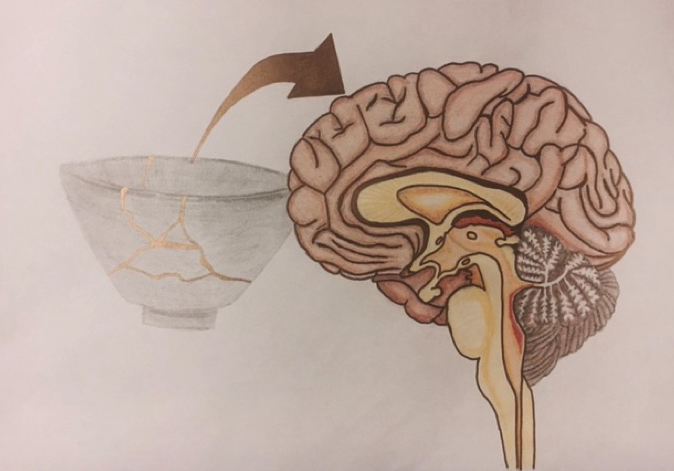The art of adding beauty to the brain
My drawing resembles a broken pot fixed with gold which Dr Bute spoke about. In my drawing I have also drawn a brain outlined with gold pen. Dr Bute explained how although the pot was broken, the fixation created something more beautiful than the original. Furthermore, the expensive and valuable material used to fix this piece (gold) make it more valuable than the original. Similarly, a broken life can develop into something greater than it was before the damage if we repair it with honour and value. In the same way, dementia can “break” the brain, causing physiological and psychological damage to the patient. However, with the art of love, a person with dementia can feel enriched again. They can become more beautiful and feel valued and dignified if those around them spent valuable time, persisted with them and showed endless care. The gold is expensive and in the same way caring for patients with dementia can be costly in terms of time and efforts but the end result for the patient is far greater. If we understand their behaviour and question why instead of losing the patience and isolating them we can help them to heal. We can allow them to retain and enjoy what they previously enjoyed. Research suggests that frustration and anger often felt by those with dementia will negatively impact their health whilst positive emotions, even if not expressed will support their health in the long-term.1
*Dr Bute has kindly given me permission to use her story in my assignment
1.Happy People Live Longer: Subjective Well-Being Contributes to Health and Longevity. Applied Psychology: Health and Well-Being. 2011; 3:1.

This conceptual piece of artwork instantly engaged me with its intriguing simplicity yet hidden meaning. I love the fact that Dr Bute views dementia the way she does, not as a sad illness that will inhibit her for the rest of her life, but one that will bring about new experiences and a wealth of appreciation for the love and beauty that she perhaps didn’t notice in her life before. My Grandfather developed Alzheimer’s over the last decade of his life, and I saw the impact this had on both him and those surrounding him. At the time there were feelings of sadness for the ‘loss’ of the great father/ husband/ grandfather/ vet that he ‘used to be’. However, now that I look back on his life in light of Dr Bute’s refreshing views, it is a shame that this was the effect that dementia had on us as my grandfather himself, other than having spells of anxiety and obvious confusion, was rarely unhappy. He had more time to sit and watch the world go by, more time to do puzzles and paintings and more time to be with the people who loved him. This is a beautiful drawing with a heart warming message, which has completely changed the meaning of dementia for me.
I love how this piece captures the positive aspects of dementia as opposed to the stigmas associated with the illness; Dr Bute’s outlook on dementia suggests that although dementia may affect the brain, it has no place to isolate or sadden her. The piece completely changes our outlook on dementia; the use of gold encourages us that even though those with dementia may lose their memories, they still hold onto the positive feelings in life.
Initially a simple and aesthetically pleasing piece of art, this has a powerful hidden message about changing the way we perceive dementia. In my time working in a care home specialising in caring for those with dementia, not once did someone have the opinion that the result of dementia could actually have a positive effect on an individual’s life. The idea that something broken can be more valuable when fixed is a beautiful concept which can be seen in the experiences of those with dementia which, before were simple, but are now a source of joy. Additionally, the anatomical beauty and complexity of the brain is highlighted in her detailed drawing using calming colours to convey a warm and optimistic mood regarding the effects of dementia.
This simple but beautiful piece of art has really changed my views of dementia as a whole. I’ve witnessed all the terrible sides of dementia, the anger, the violence and the hatred it can bring out in people and especially the impact it has on their loved ones, so I’ve never really thought about it as a positive experience. Seeing Dr Bute’s view on dementia, and how it’s something that can put you back together just as much as it can tear you apart, is something both difficult for me to grasp and intriguing. I hope in light of this, I can see past the anger and frustration and, through time and endless care, connect with the person that’s still there.
I really like how this piece represents dementia as something that a person lives with rather than suffers with. I think the pot is a great portrayal of how people with dementia can still have a quality of life if you spend time finding things that bring them joy. Having witnessed my grandad suffer with dementia and worked in a care home I have found the beauty of the connection between music and memories to be something that can help many people. I think the pot shows how things like music can help to reconnect people and the artwork conveys that people are so much more than just their dementia.